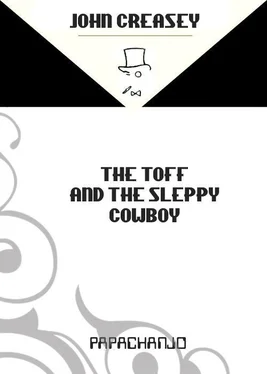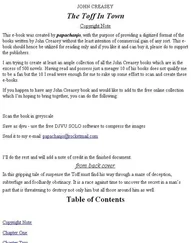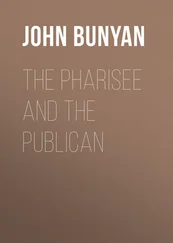John Creasey - The Toff and The Sleepy Cowboy
Здесь есть возможность читать онлайн «John Creasey - The Toff and The Sleepy Cowboy» весь текст электронной книги совершенно бесплатно (целиком полную версию без сокращений). В некоторых случаях можно слушать аудио, скачать через торрент в формате fb2 и присутствует краткое содержание. Жанр: Старинная литература, на русском языке. Описание произведения, (предисловие) а так же отзывы посетителей доступны на портале библиотеки ЛибКат.
- Название:The Toff and The Sleepy Cowboy
- Автор:
- Жанр:
- Год:неизвестен
- ISBN:нет данных
- Рейтинг книги:5 / 5. Голосов: 1
-
Избранное:Добавить в избранное
- Отзывы:
-
Ваша оценка:
- 100
- 1
- 2
- 3
- 4
- 5
The Toff and The Sleepy Cowboy: краткое содержание, описание и аннотация
Предлагаем к чтению аннотацию, описание, краткое содержание или предисловие (зависит от того, что написал сам автор книги «The Toff and The Sleepy Cowboy»). Если вы не нашли необходимую информацию о книге — напишите в комментариях, мы постараемся отыскать её.
The Toff and The Sleepy Cowboy — читать онлайн бесплатно полную книгу (весь текст) целиком
Ниже представлен текст книги, разбитый по страницам. Система сохранения места последней прочитанной страницы, позволяет с удобством читать онлайн бесплатно книгу «The Toff and The Sleepy Cowboy», без необходимости каждый раз заново искать на чём Вы остановились. Поставьте закладку, и сможете в любой момент перейти на страницу, на которой закончили чтение.
Интервал:
Закладка:
“Gee,” he said, “it’s different.”
“Very different?” asked Rollison.
“Oh, sure, different. There’s so much green,” observed Loman. “And all of the cars are so small. And a lot of people walk.”
“Don’t they in Tucson?” asked Raison.
“Only down town — say, this isn’t London yet, is it?”
“We’re on the outskirts.”
“I will say one thing,” said Loman after a pause. “Everything sure is green.” He edged up in his seat and looked about him for a long time, and then declared “It sure is green.”
“We get a lot of rain,” remarked Rollison, solemnly. “Rain,” echoed Loman, and added: “Sure. We get ours in July and December.”
Rollison wondered how long it would be before the man began to explain; there was no great hurry as far as he could judge, and it may even have to wait until they reached Gresham Terrace. He had not called Jolly, so Jolly would have lunch ready. He glanced in the driving mirror, and saw the police car. He would be followed wherever he went until the mystery was solved or unless he gave his shadowers the slip. There was no need to do that yet. He passed the end of Hood Lane, and half-smiled at the thought of Pamela Brown, who certainly hadn’t told all she knew. Behind that sweet and innocent façade and ingenuousness of manner was a sharp and undoubtedly devious mind. An M.G. not unlike hers passed in the opposite direction, with a man at the wheel.
“Excuse me,” Loman said.
“Yes,” said Rollison promptly.
“I didn’t get your name.”
“You didn’t —” began Rollison, and actually took his eyes off the road to look sharply at the American. But Loman was now sitting back, eyes half-closed, a dreamy smile on his face. He had a remarkable profile, a face half as long again as an average face but everything in proportion; his eyes were deep and seemed to push his cheekbones down. His upper lip was long, and so was his chin; in profile it did not seem to be so spade-shaped.
Unless he was very clever at dissembling, this young man meant exactly what he said: he had not caught Rollison’s name.
Rollison drew in a deep breath.
“My name is Richard Rollison,” he stated carefully. “Of 25g, Gresham Terrace.”
Loman began to frown. Out of the corner of his eyes Rollison saw him glance towards him, a quick, appraising glance. He sat even more upright in his seat, and after a while said:
“Richard Rallison.”
“Rollison.”
“Row-lisson.”
“There are two ells, which make the ‘o’ short,” explained Rollison, and pronounced his name again with great care. Traffic was now very thick and he needed to concentrate on driving, so dared not look at the American who had now twisted round in his seat and was staring, much as Pamela Brown had earlier.
Very slowly and deliberately, he said:
“Rol-liss-on.”
“That’s it,” approved Rollison. “That’s exactly right. Richard Rollison.”
“Then,” stated Thomas G. Loman, “you are the man I’ve come to see.”
“That’s what it said on your aeroplane ticket as I understand it,” Rollison agreed. “When the police dis-covered that, and also discovered that you had been given a shot of morphine and afterwards robbed, they asked if I would come and see you. That’s why I’m here.”
They were now out of the various overpasses and in Cromwell Road, with the tall, old-fashioned terraced houses on either side. Traffic was very thick, the stench of fumes nauseating on a warm English autumn day. A huge B.E.A. coach pushed by, crowding Rollison; the car behind him hooted. It wasn’t the police car, which had fallen farther behind. Soon, they were in thinner traffic by the Kensington museums, but a thick bottleneck at the approach to Knightsbridge lay ahead.
“Mr. Rollison,” Loman said, suddenly: “Is this London?”
“Yes — this is near the heart of London.”
“Those are pretty big buildings on the left.”
“They are museums. We are just entering Knights-bridge, one of the several centres of London.” Rollison found himself talking like a tour guide, and even enthusing over London. Unless the traffic was slowed down to a crawl in Piccadilly they would be in Gresham Terrace in ten minutes, and this was neither time nor place to start a game of questions and answers. It crossed his mind that Loman might open the door and get out when they were at a standstill, but the young American showed no sign of doing that. Indeed, he marvelled.
“That’s sure bigger than Levy’s,” he said of Harrods. “Levy’s?”
“That’s the biggest department store in Tucson. That place is bigger. Harrods.” He looked about him at thronged pavements, shops and tall buildings, and was startled when they drove beneath the Hyde Park Under-pass. As they came up in Piccadilly he said: “Gee! That park has more trees than Randolph, and it sure is green. You must have a lot of rain in England.”
“We have enough,” Rollison said, wryly. He put on his blinker for the next left hand turn, since Gresham Terrace was now only a few hundred yards away. He made the turn, with Thomas G. Loman still looking about him. Then Loman straightened up as Rollison said: “We’ll be at my home in two or three minutes.”
“That’s fine,” said Loman. “I am surely looking forward to seeing an English home, Mr. Rollison.” He put a slightly exaggerated emphasis on the ‘Roll’ but otherwise pronounced the name well. “Would you mind answering me a question? Would you mind telling me why you asked me to come and see you? Because I sure would like to know.”
7
Dead End
“MR. LOMAN,” ROLLISON SAID, somehow holding on to his patience. “What are you called? Tom or Thomas or Tommy or what?”
“Tom,” answered Loman, calmly. The fact that Rollison had so parried his question did not seem to affect him at all. “Just Tom. What do they call you? Richard? Or Dick? Or Dickie?”
Rollison shuddered.
“Never Dickie,” he replied. “Seldom Dick. Often Richard. Much more often, Rolly.”
“Like in holly?” asked Loman.
“Exactly as in holly.”
“Thanks.”
They were in Gresham Terrace, and by one of the near miracles that can make or mar a modern day, a parking space loomed up only a few yards from Number 25. Rollison manoeuvred the car into it, inches from the kerb, and Loman uncoiled himself and got out. He stood at his full height, peering up at the tall, graceful buildings, and slowly shook his head.
“I’ve never seen any place like it,” he declared.
“Except for a few dozen streets about here, there aren’t any,” Rollison told him. “There’s one grave dis-advantage. There is no lift.”
“Come again.”
“No lift — no elevator.”
“You mean you walk up? Like in a New York brown-stone?”
“Yes. And I live on the top floor.”
“If there’s one thing I have learned about you,” volunteered Thomas G. Loman. “It’s that you like doing things the hard way.” He looked up and down the street again, seeing the great variety of parked cars and a dozen people including a nursemaid holding a toddler by the hand, and then he actually patted the roof of the car. “What do you call her?” he asked.
“A nurse,” answered Rollison, with resignation. Loman looked astonished. “You call her —” he broke off, and smiled.
He had half-smiled before, just showing his white teeth set in the angular lower jaw, but this was the first time Rollison had really seen him smile as if he were deeply amused. It created deep lines at his eyes and others at the corners of his mouth, and it sank his jaw inches lower than its norm. Also, it wrinkled his nose at either side; there was no doubt at all that it made him look remarkably like a horse; a happy horse, Rollison thought with helpless indulgence.
Читать дальшеИнтервал:
Закладка:
Похожие книги на «The Toff and The Sleepy Cowboy»
Представляем Вашему вниманию похожие книги на «The Toff and The Sleepy Cowboy» списком для выбора. Мы отобрали схожую по названию и смыслу литературу в надежде предоставить читателям больше вариантов отыскать новые, интересные, ещё непрочитанные произведения.
Обсуждение, отзывы о книге «The Toff and The Sleepy Cowboy» и просто собственные мнения читателей. Оставьте ваши комментарии, напишите, что Вы думаете о произведении, его смысле или главных героях. Укажите что конкретно понравилось, а что нет, и почему Вы так считаете.












